This announcement came after the UN confirmed that an “evacuation operation is underway” in Azovstal, in coordination with the Red Cross, Russian troops and Ukrainian forces, without giving further details.
The Azovstal industrial area is the last stronghold of Ukrainian resistance in the southern Ukrainian port city of Mariupol, which is now controlled by Russia.
Living conditions in the network of tunnels under the steelworks were described as appalling. So far previous evacuation efforts have failed.
“The first group of about 100 people is already on its way to a controlled area. Tomorrow we will meet them in Zaporizhia,” Zelensky said on his Twitter account.
In parallel, the Russian Ministry of Defense claimed that 80 civilians had left this industrial site and were driven towards Russian-controlled eastern territories.
The Defense Ministry released a video of the evacuations showing civilians arriving by bus in the town of Bezimenne, halfway between the Russian border and Mariupol, where they are received by UN and ICRC envoys under surveillance of Russian soldiers.
It is not clear where the difference in evacuees between one source and the other comes from, but the Russian Ministry of Defense already announced on Saturday that about 50 civilians had left Azovstal.
“BARBARIAN” BOMBING
The fate of the civilians of this strategic city has focused the attention of world leaders.
This Sunday, the Pope reiterated his request that safe humanitarian corridors be opened during the Angelus prayer in St. Peter’s Square in the Vatican.
“My thoughts are with the Ukrainian city of Mariupol, the city of Maria, bombed and destroyed in a barbaric way,” the pontiff said.
The invasion launched by Russia on February 24 has left thousands dead and millions displaced, and Western countries and their allies have moved to deliver war aid to Ukraine and have imposed tough sanctions on Russia.
“You shouldn’t be intimidated by bullies,” House Speaker Nancy Pelosi told a news conference in Poland after visiting Ukraine on Saturday where she met with President Zelensky.
Pelosi — which is the third most important representative position in the United States, after the president and vice president — expressed her country’s “unequivocal” solidarity with Ukraine.
“The United States leads in strong support for Ukraine in the fight against Russian aggression,” Zelensky tweeted to accompany a video of him being seen greeting Pelosi and the congressional delegation at the presidential gates in Kiev.
Zelensky welcomed the “very important signals” given by the United States and President Joe Biden, who on Thursday asked Congress for an additional $33 billion for Ukraine, $20 billion of which will go to weapons, nearly seven times the amount of arms and ammunition already supplied to that country since the Russian invasion began.
In this sense, Pelosi promised that legislation will be passed to approve the aid proposal launched by Biden.
“DIFFICULT SITUATION IN THE EAST”
The conflict is concentrated in the east and south of Ukraine, although there are Russian missile bombardments throughout the country, mainly with the aim of destroying infrastructure and supply routes.
For the Russians, the complete conquest of the port city of Mariupol would allow them to unite the conquered territories in the south, in particular the Crimean peninsula annexed in 2014, with the pro-Russian breakaway republics of Donetsk and Lugansk in the east.
Precisely on this eastern flank, the Russian army, numerically superior to its Ukrainian adversary and better equipped with artillery, is seeking control, from the north and the south, to complete its dominance over Donbas.
A senior Ukrainian military official said he spoke with US Joint Chiefs of Staff Mark Milley about the “difficult situation in the east,” particularly “in the Izium and Sieverodonetsk areas, where the enemy concentrated its maximum efforts.”
Russian bombardments this Sunday on areas of Kharkiv and Donetsk left eight civilians dead, four of them in the city of Lyman, close to the front and threatened by the Russian advance, the regional governments announced.
But Ukrainian forces have also recaptured territory in recent days, especially around the city of Kharkov.
One of the areas retaken from Russian control was the village of Ruska Lozova, which evacuees say was occupied for two months.
“We stayed in the cellars without food for two months, we ate what we had,” a 40-year-old resident told AFP.
INTRODUCTION OF THE RUBLE
Russian Foreign Minister Sergei Lavrov maintains that the military operation is proceeding as planned by Russia and has warned Western countries to stop sending military aid to Ukraine.
In areas controlled by Russia, Moscow seeks to establish dominance and on Sunday introduced the ruble as currency in the Kherson region, although it will also allow payment with Ukrainian currencies.
“From May 1, we are going to incorporate the ruble zone,” reported Kirill Stremousov, the authority that governs Kherson, quoted by the Russian state agency RIA Novosti.
The administrator indicated that there will be a four-month period during which Ukrainian currencies can be used, but after that there will be a full switch to the ruble.
Meanwhile, on the front lines, the Ukrainian military rotates to combat fatigue and maintain their positions on the front line.
“Everyone understands that we have to hold the line here, we cannot let the enemy get closer,” Lieutenant Yevguen Samoilov told AFP during an operation to allow his troops to rest after two months of fighting.
“We tried to resist with all new forces,” he said.
















